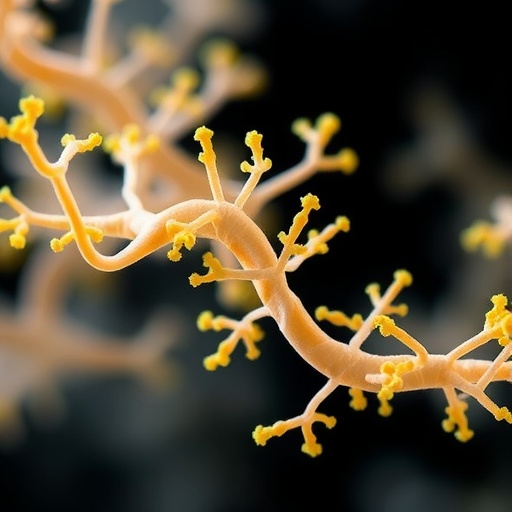In a transformative advancement poised to redefine protein production in the field of biomanufacturing, researchers from Nagoya University in Japan have developed a groundbreaking technology aimed at significantly improving the efficiency of protein synthesis in the widely utilized microorganism, Escherichia coli. Dubbed a potential game-changer, this innovation seeks to address a persistent challenge in the biotechnological application of microbial proteins, which are integral to the production of a variety of life-altering products, ranging from pharmaceuticals to sustainable biofuels.
Proteins derived from microorganisms have been garnering increasing attention due to their vast potential in diverse applications, notably their role in the creation of industrially relevant products such as enzymes, diagnostic antibodies, and biofuels. These applications underscore the importance of harnessing microbial systems for producing proteins that serve as environmentally friendly alternatives to petroleum-based products. Given the global push toward sustainability, efficient microbial protein synthesis could serve as a foundational technology for a more sustainable manufacturing ecosystem. Improved yields in protein production can contribute significantly to the viability of biomanufacturing processes, which are essential for reducing dependency on fossil fuels and transitioning to renewable resources.
E. coli, a microorganism commonly used in biological research and industrial applications, has historically been preferred for protein production due to its cost-effectiveness. However, the challenges associated with the intricate nature of gene sequences often hinder the optimization of protein yields in this system. Specifically, ribosome stalling—a phenomenon where ribosomes cease to synthesize proteins due to various hindrances—has been recognized as a major bottleneck affecting overall protein production. This stall can severely impact the efficiency and yield of target proteins, complicating what is otherwise a straightforward cell-free protein synthesis process.
In the forefront of tackling this issue, Associate Professor Teruyo Ojima-Kato and her team conducted investigations that illuminate the mechanisms underpinning ribosome stalling. They discovered that by appending a short two-dimensional peptide sequence—comprising four specific amino acids: serine, lysine, isoleucine, and lysine—to the N-terminus of target proteins, they could effectively minimize ribosomal stalling. This result is not merely an incremental advancement; it signifies a paradigm shift in the approach to prototype translation efficacy in E. coli systems.
Building on this foundational discovery, the research team took further steps to explore the repertoire of short translational-enhancing peptides (TEPs) to identify additional sequences that augment translation efficiency while circumventing the challenges of ribosome stalling. This phase of research culminated in the creation of a vast tetrapeptide library, a remarkable collection consisting of 160,000 unique peptide sequences formed from all conceivable combinations of the aforementioned four amino acids. This extensive library serves as a pivotal resource in the quest to unlock new enhancements to protein synthesis in microbial systems.
Through rigorous experimental analysis, the researchers employed artificial intelligence (AI) as a powerful tool to evaluate the translation-enhancing capabilities of the entire library of tetrapeptides. The AI predictive model utilized data sourced from approximately 250 experiments, providing an advanced analytical framework to ascertain the potential of previously untested peptide sequences in real-time. This innovative approach not only demonstrates the efficacy of AI in guiding biotechnology research but also promises to streamline the design process for peptide-based enhancement strategies aimed at improving protein synthesis.
The outcomes of these investigations have far-reaching implications for the biomanufacturing sector. By significantly lowering the incidence of ribosome stalling during protein synthesis, this new technology can pave the way for the efficient production of essential enzymes that fulfill critical roles in the biorefinery field. Biorefineries, which turn renewable biomass into valuable chemicals and biofuels, stand to benefit immensely from improved enzyme yields. As societies search for sustainable alternatives to conventional manufacturing models that rely heavily on petroleum resources, these developments could support a transition towards greener, more circular economic practices.
Kato’s insights emphasize the revolutionary potential vested in these short peptide sequences, arguing that such advancements may indeed lay the groundwork for next-generation protein production technologies. In this light, the investigation beckons a new era for protein synthesis, wherein synthetic peptides could not only enhance translation efficiency but also engender new possibilities for biosynthetic pathways in diverse applications ranging from pharmaceuticals to renewable energy sources.
As this research progresses, it prompts reflection on the molecular intricacies of protein production and the nature of biotechnology’s capacity to innovate. By leveraging the molecular foundations of life, researchers are unlocking the door to unprecedented sustainable production methodologies. The integration of novel peptide sequences and AI predictive analytics heralds an era where biomanufacturing processes become more scalable, reproducible, and efficient than ever before.
The journey from discovery to application remains fraught with challenges; however, as these researchers venture further into the depths of microbial protein synthesis, they provide hope that future bioproducts will play an indispensable role in sustainable innovation. With a continued focus on efficiency, the implications of these findings extend beyond mere academic curiosity, influencing broader industrial pursuits and environmental strategies on a global scale. As we bear witness to the unfolding of these advancements, the fusion of biology, technology, and sustainable practices becomes increasingly apparent.
In summation, this groundbreaking research from Nagoya University offers an exciting glimpse into the future of protein production, where microbial systems and advanced scientific methodologies converge to create a more sustainable world. The implications of such innovations extend far beyond the laboratory, presenting solutions to global challenges and aiding in the quest for a greener tomorrow.
Subject of Research: Efficiency of protein production in Escherichia coli
Article Title: Novel Peptide Sequences Enhance Protein Production Efficiency in Microbial Systems
News Publication Date: 22-Oct-2025
Web References: Nagoya University
References: RSC Chemical Biology
Image Credits: Teruyo Ojima-Kato
Keywords
Life sciences, Biochemistry, Biomolecules, Proteins, Amino acids, Enzymes, Protein functions
Tags: biomanufacturing and sustainabilitydiagnostic antibodies productionefficient protein synthesisenvironmentally friendly protein sourcesEscherichia coli in biotechnologyindustrial enzyme developmentmicrobial protein production advancementsmicrobiological protein applicationspharmaceuticals from microorganismsprotein production techniquesrenewable resource alternativessustainable biomanufacturing innovations





